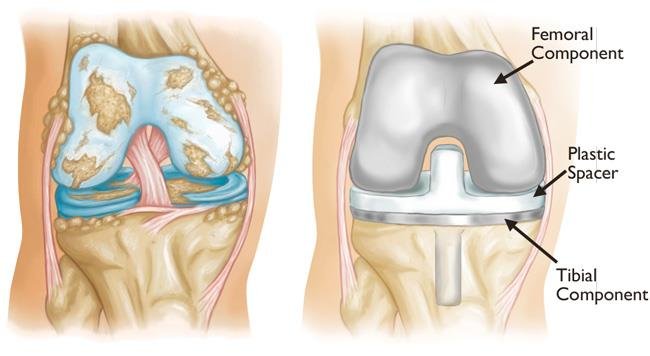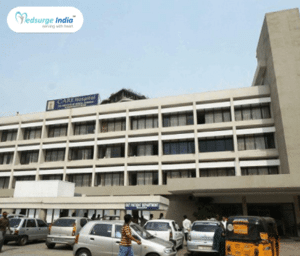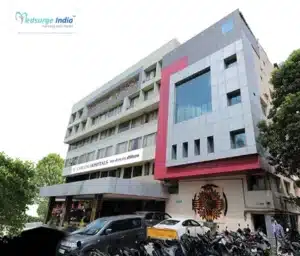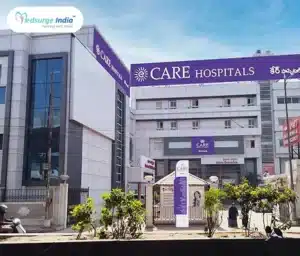Knee Replacement Surgery Cost in India
Unlock Exclusive Discount : Your Gateway to Premium Healthcare with Medsurge India Health Value Card.

Unlock Exclusive Discount : Your Gateway to Premium Healthcare with Medsurge India Health Value Card.


Are you looking for affordable and safe knee replacement surgery in India? India is a renowned destination for patients worldwide, offering advanced care with experienced orthopedic and joint replacement surgeons in modern hospitals. Patients receive personalized treatment plans and comprehensive support throughout their medical journey.
With expert doctors, state-of-the-art technology, and cost-effective healthcare, India ensures high-quality treatment for both domestic and international patients.
Knee replacement surgery, also known as knee arthroplasty, is a surgical procedure to treat severe chronic knee pain and restricted mobility caused by arthritis or injury. The procedure involves replacing damaged bone and cartilage with artificial implants made of metal and plastic.
Knee replacement is recommended for several reasons, including:
On average, knee replacement surgery costs in India range between $1600 to $8000, though actual costs depend on several factors. Leading hospitals in India offer advanced medical care with experienced orthopedic and joint replacement surgeons using modern, safe techniques. Every patient receives tailored treatment, precision surgical care, and guided rehabilitation designed to relieve chronic joint pain, restore movement, and help them return to an active, confident life.
Knee replacement treatment in India is planned according to each patient’s condition, level of joint damage, age, and mobility needs, and may include partial or total knee replacement with different implant options. The table below provides an overview of the approximate costs for various treatment approaches.
| Treatment Type | Approx. Cost in India (USD) |
| Total Knee Replacement | $4,000 to $8,000 |
| Partial Knee Replacement | $4,000 to $8,000 |
| Revision Knee Replacement | $3,500 to $6,500 |
Knee replacement surgery cost in India depends on several factors, including:
| City | Approx. Cost |
| Delhi | $4,000 to $8,500 |
| Mumbai | $4,500 to $9,000 |
| Chennai | $3,800 to $7,500 |
| Bangalore | $4,200 to $8,000 |
Note: Actual costs may vary depending on the hospital, procedure type, and individual treatment plan.
The total cost of knee replacement surgery in India for international patients is a bit higher than for domestic patients and depends on various factors. Planning in advance allows patients to manage their budget effectively and experience a comfortable, stress-free treatment journey.
The overall cost may vary depending on the duration of hospitalization, the type of implant used, and the time required for initial mobility recovery. Some patients may need a slightly extended stay for monitoring, pain management, or supervised physiotherapy before traveling back home. It is vital to plan accordingly for your stay and recovery to ensure a safe and smooth return.
The cost of knee replacement surgery in India is nearly one-fourth of the price in Western countries, making it a safe, efficient, and affordable option for both domestic and international patients. The table below highlights the approximate cost difference:
| Country | Approx. Surgery Cost |
| India | $4,000 to $8,500 |
| USA | $35,000 to $70,000 |
| UK | $18,000 to $35,000 |
| Germany | $20,000 to $40,000 |
| UAE | $15,000 to $30,000 |
Several diagnostic tests are performed before knee replacement surgery, including:
There are two types of knee replacement surgery:
The patient needs to stay in the hospital for 2-3 days for pain management and initial monitoring. Walking or standing is encouraged with assistance on day 1 or 2. Regular physiotherapy is required to regain strength and mobility. Most patients resume their normal activities within 4-5 weeks, and full recovery may take 3-6 months.
Knee replacement surgery in India has a high success rate, ranging between 90% to 95%, and modern high-quality implants can last 15 to 20 years or more. The success rate also depends on the expertise of the surgeon, the use of advanced technology, and strict adherence to physiotherapy.
India differs from other countries in several ways when it comes to orthopedic treatments:
If you are looking for affordable and safe knee replacement surgery in India, Medsurge India will help you find the right doctors and hospital to make your medical journey hassle-free. We have a team of dedicated members who assist you throughout your entire journey to manage all the arrangements. From medical visa support, airport pickup, accommodations, doctor’s consultations, to post-treatment follow-up, we’ll handle everything.
Additionally, through our Health Value Card, patients can enjoy exclusive benefits, special offers, priority care, and dedicated support services, ensuring a seamless and budget-friendly treatment experience.
| Estimate Type | Estimated Cost (USD) |
|---|---|
| Total Package Estimate | USD 1,600 – USD 8,000* |
*Final cost depends on hospital, patient condition, and additional procedures/devices if required. Share your reports to get an accurate quote.
Estimated cost range in India: USD 1,600 – USD 8,000*
*For an accurate quote and hospital options, share your reports and preferred city/hospital.
The cost of knee replacement surgery in India depends on various factors such as the surgical approach, type and quality of implant, surgeon’s expertise, hospital’s choice, diagnostic tests, and post-surgery care.
Knee implants will last at least 20 years or longer with proper care.
Before leaving the hospital, most patients practice climbing stairs under supervision. By week 3 after the surgery, patients can often climb stairs without any assistance.
Knee replacement surgery in India has a high success rate, ranging between 90% to 95%.

Orthopaedic and Joint Replacement Surgeon
Senior Consultant
24+ years
Care Hospital, Banjara Hills, Hyderabad
View Doctor
Orthopaedic and Joint Replacement Surgeon
Clinical Director & Head of Department
38+ years
Care Hospital, Banjara Hills, Hyderabad
View Doctor
Ortho Spine Surgeon
Clinical Director & Senior Consultant
22+ years
Care Hospital, Banjara Hills, Hyderabad
View Doctor
Orthopaedic and Joint Replacement Surgeon
Head of Department
10+ years
Care Hospital, Bhubaneswar
View Doctor
Ortho Spine Surgeon
Senior Consultant
12+ years
Meitra Hospital, Calicut, Kerala
View Doctor
Orthopaedic and Joint Replacement Surgeon
Associate Consultant
18+ years
Meitra Hospital, Calicut, Kerala
View Doctor
Orthopaedic and Joint Replacement Surgeon
Consultant
18+ years
Care Hospitals HITEC City
View Doctor
Orthopaedic and Joint Replacement Surgeon
Consultant
15+ years
Care Hospitals HITEC City
View Doctor
Ortho Spine Surgeon
Consultant
9+ years
Care Hospitals HITEC City
View Doctor
Orthopaedic and Joint Replacement Surgeon
Senior Consultant
17+ years
Baby Memorial Hospital
View Doctor









By using our site, you agree to our Terms and Conditions, Privacy Policy and Refund Policy. Medsurge India provides reliable healthcare information and treatment options to support informed decision-making. Our content is designed to support and complement the guidance of your treating doctor, helping you feel informed and confident throughout your healthcare journey. We also Accept International Payments.

Copyright © 2025 NSM ONLINE SOLUTIONS PRIVATE LIMITED. All rights reserved.